WWF and PCEPSDI Conduct Action-Planning Workshop For the Sustainable Diner Project Stakeholders
September 2018
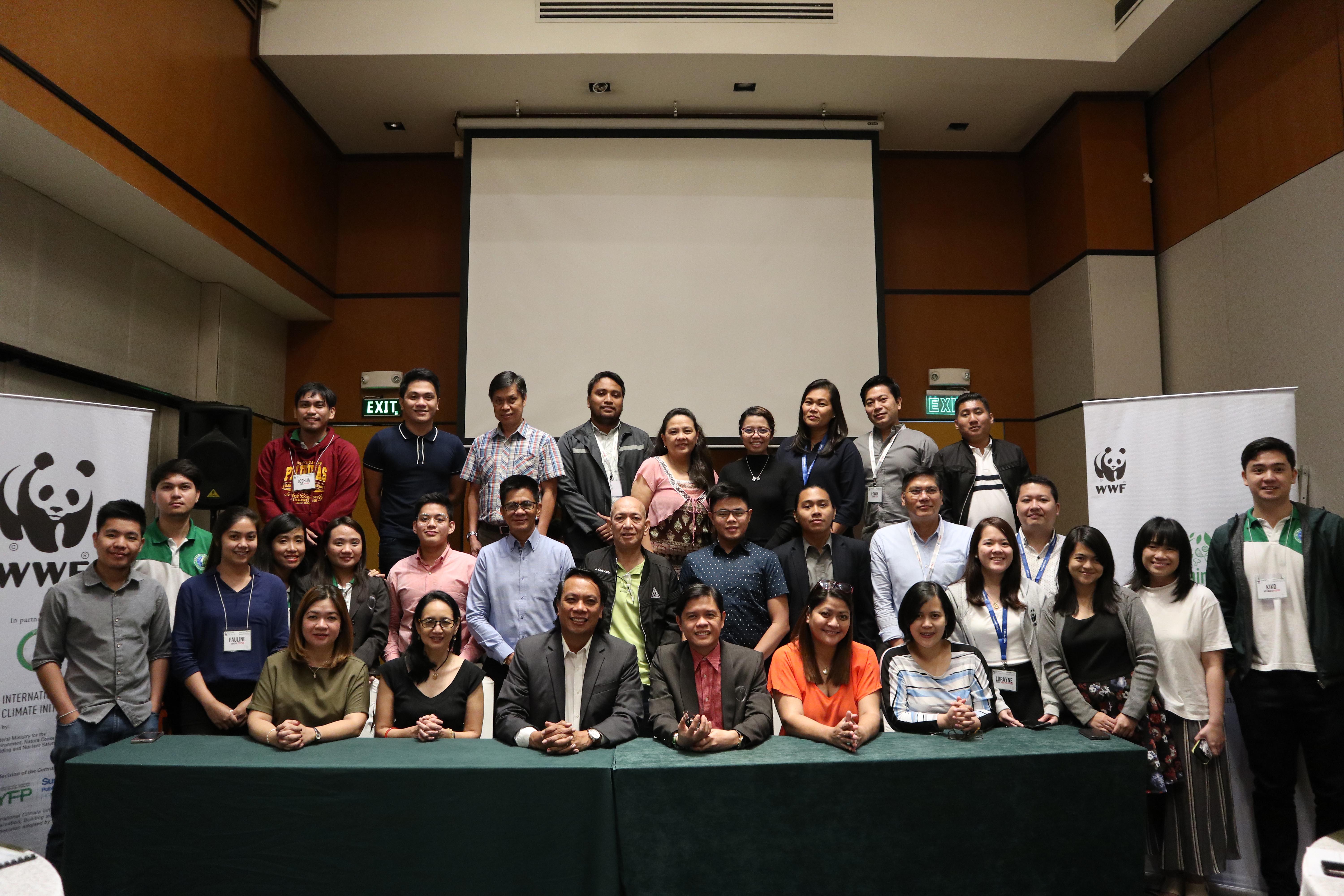
The participants of the Action-Planning Workshop come from the government, both national and local, the food service industry, the academe, and civil society organizations. Photo © Gabriel Villalon / WWF-Philippines
Last September 24 and 25, 2018, World Wide Fund for Nature (WWF) Philippines’ The Sustainable Diner: A Key Ingredient for Sustainable Tourism project, through its partner, The Philippine Center for Environmental Protection and Sustainable Development, Inc. (PCEPSDI), conducted a two-day Action-Planning Workshop at the Eastwood Richmonde Hotel, Quezon City. Stakeholders from the national and local government, the food service industry, the academe, and other civil society organizations were gathered to determine processes and perspectives which affect the advancement of sustainable consumption and production (SCP) in the food service sector on both the national and local business levels.
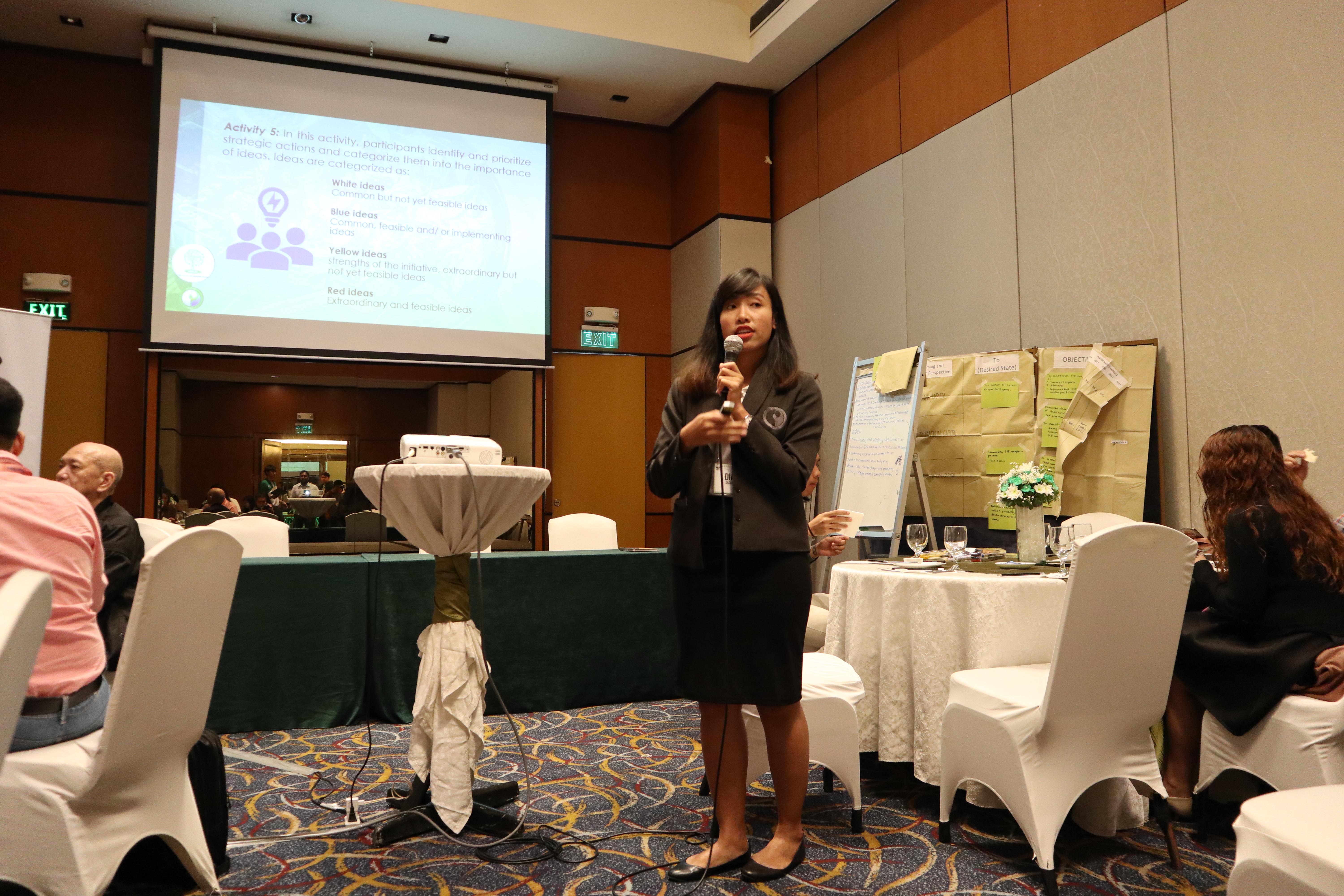
Diana Sadili, Project Officer of PCEPSDI, served as the host and moderator for the two-day workshop. Photo © Gabriel Villalon / WWF-Philippines
The aims of the action-planning workshop were to define the long-term strategic goals of the select national and local government units on the implementation of SCP in the food service industry, to integrate SCP principles in local and national policies and plans, to help address the foreseen hurdles in the project implementation, and to identify opportunities and actions for successful implementation and integration of SCP in the operations of food service establishments nationwide. The workshop produced a draft action plan for the integration of SCP in the food service industry at the national and local business levels.
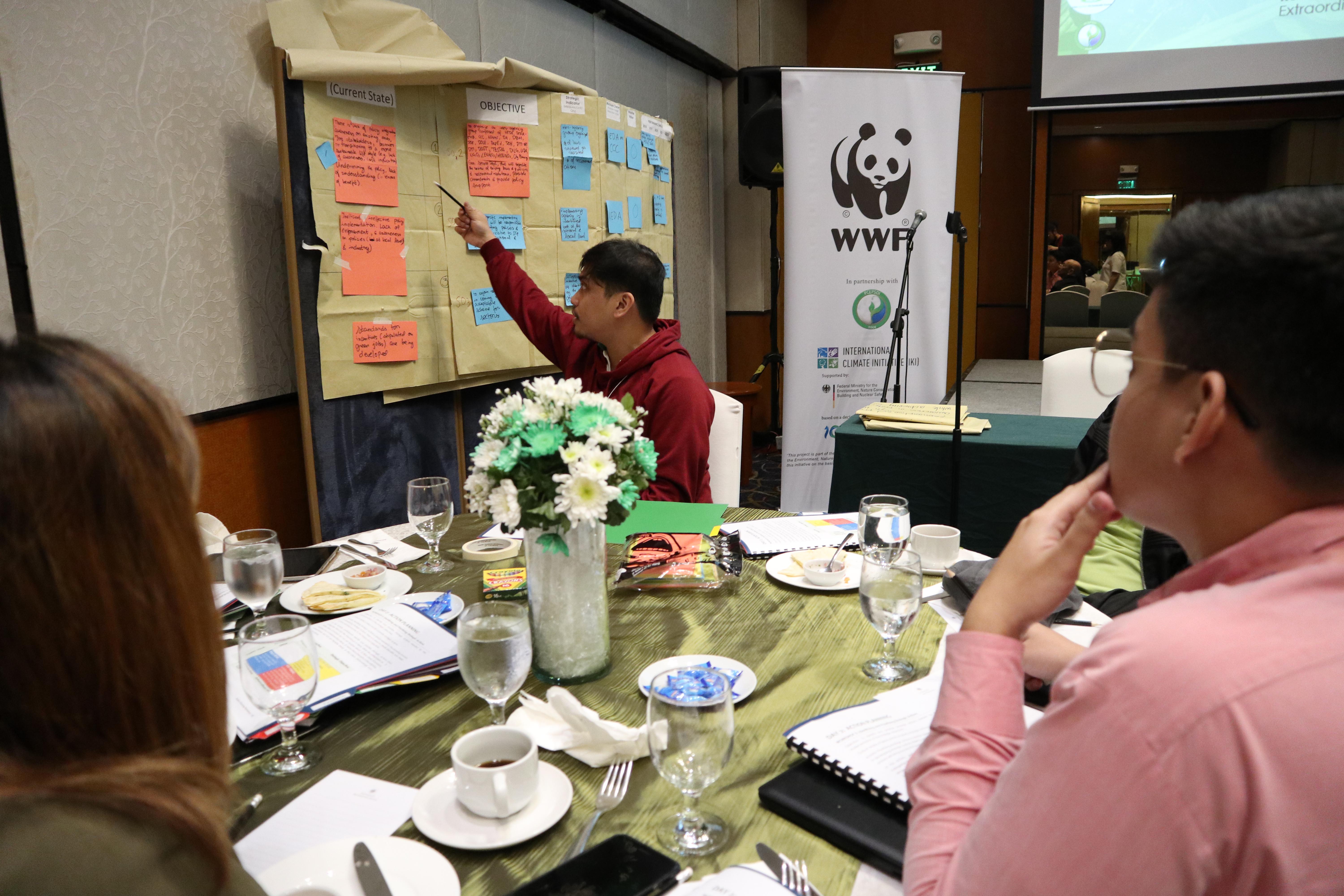
The two-day action-planning workshop involved a lot of group discussions, where the participants were divided into four groups. Joshua Ladia, Project Officer of PCEPSDI, facilitated the exchange of ideas in one of the groups. Photo © Gabriel Villalon / WWF-Philippines
The workshop was divided into seven activities, where participants were grouped for seamless discussion and exchange of ideas:
- Activity 1: Rapid Assessment of Sustainable Consumption and Production in the food service industry at the national and local government unit level
- Activity 2: Vision and Mission Setting on Advancing SCP in the food service industry
- Activity 3: Developing Strategic Objectives
- Activity 4: Developing the Scorecard Strategic Measures and Indicators
- Activity 5: Identifying and Prioritizing Strategic Actions
- Activity 6: Identifying and Analyzing Risks and Opportunities
- Activity 7: Identifying National and Local Policies and Plans to best integrate SCP in the food service industry
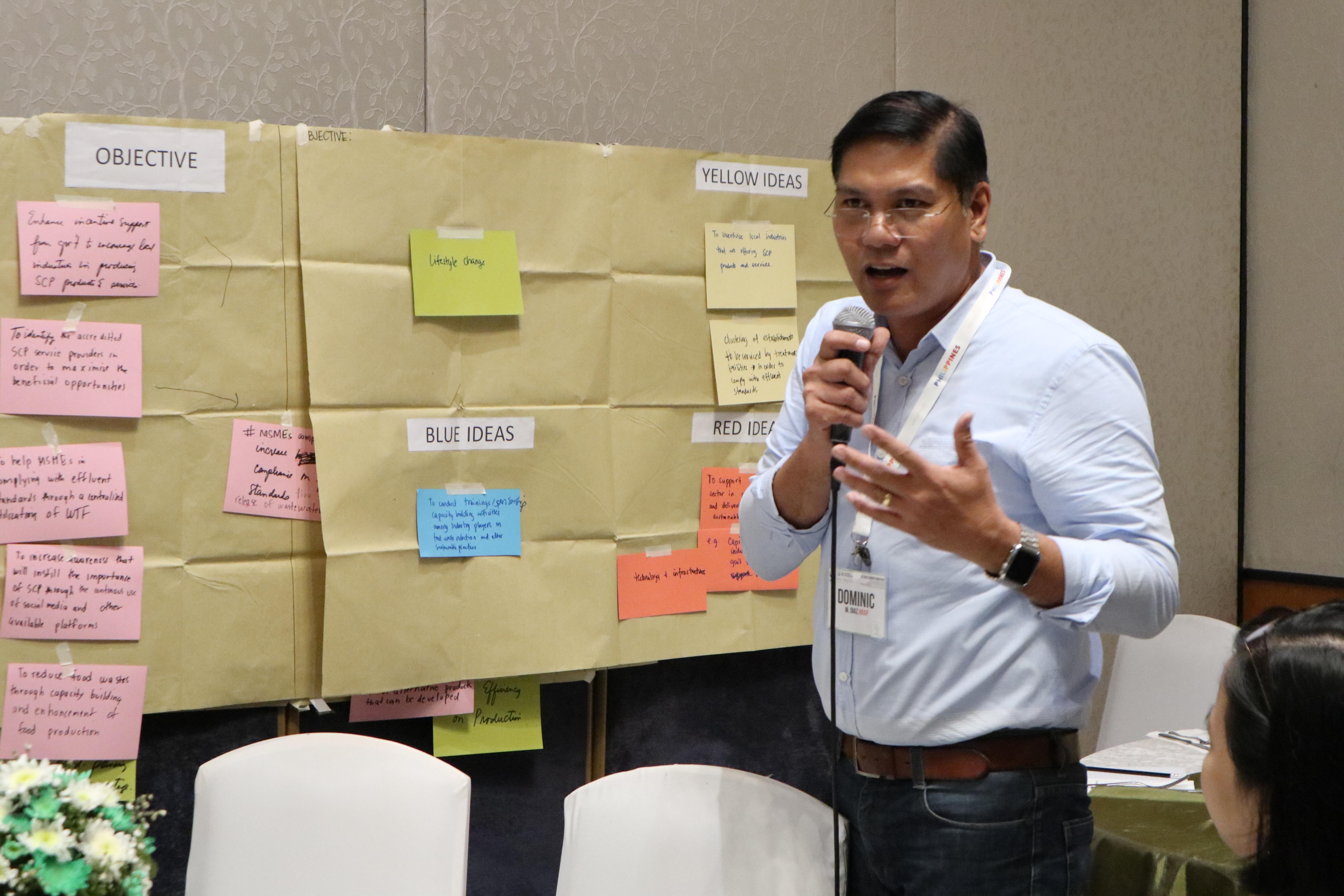
Dominic Diaz of the Hotel & Restaurant Association of the Philippines (HRAP) presented the finance-related risks and opportunities that his group identified and analyzed. Photo © Gabriel Villalon / WWF-Philippines
Each activity ended with a presentation of group outputs, where the four groups were assigned a specific perspective to tackle: Learning and Growth, Financial, Stakeholders, and Process. The outputs per activity were collected to synthesize the results of the workshop and to come up with the draft action plan for SCP integration in the food service industry.
Dr. Neric Acosta closed the workshop by sharing his thoughts on the success of the integration of SCP principles in the foodservice industry. “We cannot manage those that we cannot accurately measure. This kind of workshop is very important because it allows us to gather and measure data on total consumption, consumption patterns, consumption habits, as well as on the production side - where our food comes from, what kind of products restaurants are selling, which commodities are currently present in the food service industry. Add to that, the waste generated from both consumption and production. That’s a lot of quantitative and qualitative data we need to measure and analyze and if we cannot measure them, we cannot likely manage”, says Dr. Acosta. “When it comes to relating this to environmental protection, protection really comes from valuing, and valuing comes from understanding. You cannot protect that which you cannot first truly value. Together, this is what we, as project stakeholders, need to always remember when we start rolling out our interventions for the successful implementation of SCP in the local foodservice industry,” he added.
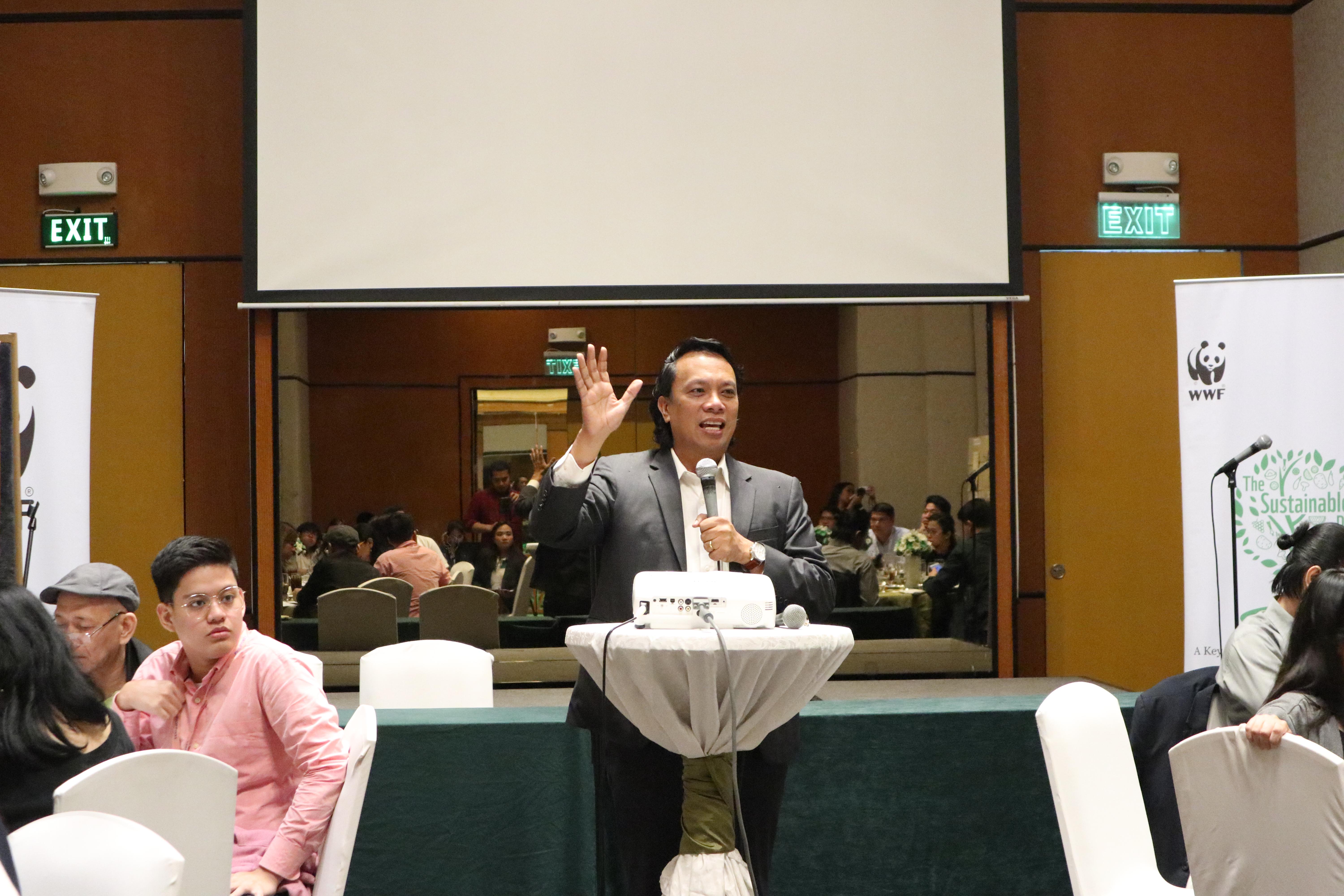
Dr. Neric Acosta, Chairperson of PCEPSDI and a former cabinet member under the Aquino administration, closed the workshop by sharing his thoughts on how SCP principles can be successfully integrated in local dining operations. Photo © Gabriel Villalon / WWF-Philippines
The two-day workshop served its purpose as a dynamic and interactive gathering of key stakeholders involved in the successful implementation of SCP principles not just in the three partner cities of the project - Quezon City, Cebu City, and Tagaytay City - but in the entire country. It just goes to show that when the different sectors of society work together towards a common goal, it is possible to integrate sustainability in the local food service industry and also in all the industries relevant in our country’s economic and sustainable development.
The Sustainable Diner project, under World Wide Fund for Nature (WWF) Philippines’ Sustainable Consumption and Production, is part of the International Climate Initiative (IKI). The Federal Ministry for the Environment, Nature Conservation, and Nuclear Safety (BMU) supports this initiative on the basis of a decision adopted by the German Bundestag.
